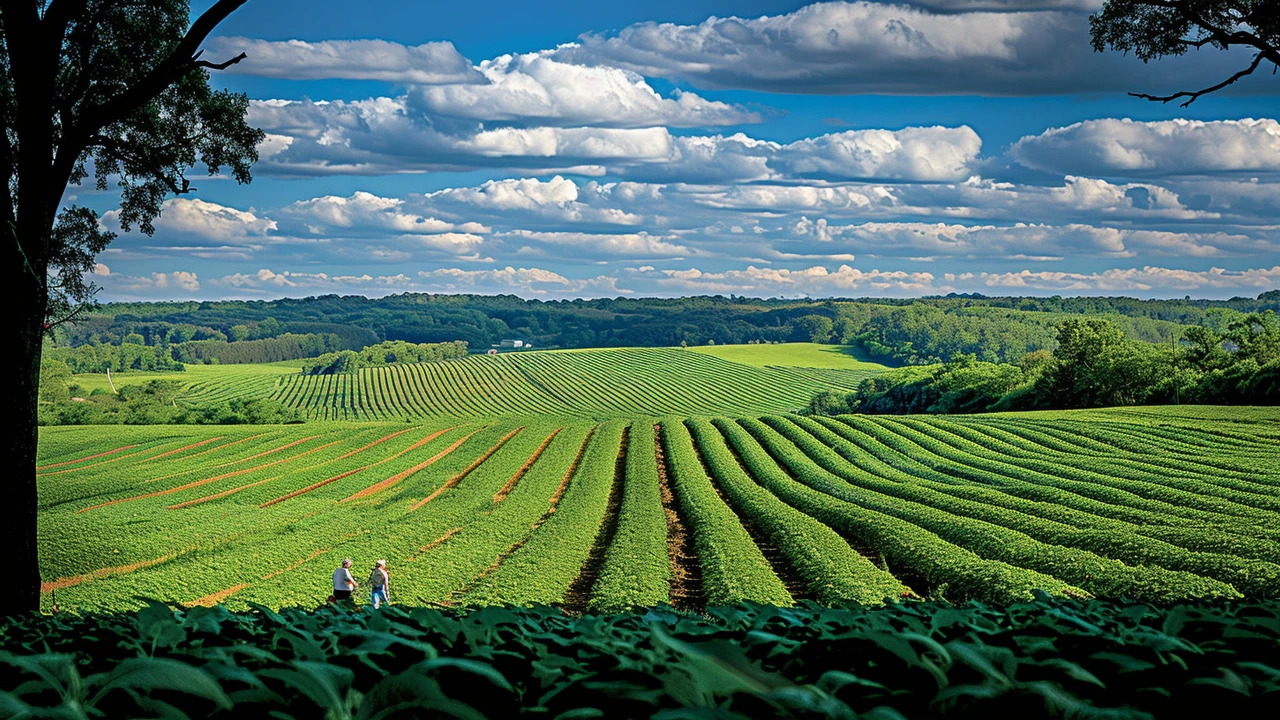The Urgent Call for Land Restoration
The Director General of the International Union for Conservation of Nature (IUCN) has issued a compelling statement for World Environment Day 2024. Reflecting on the profound changes in humanity's relationship with the earth, the Director General stressed the urgent need to address land degradation on a global scale. This year's World Environment Day places a spotlight on the concerning fact that approximately 40% of the world's land has succumbed to degradation, primarily due to deforestation, overgrazing, and unsustainable agricultural practices.
As the statement underscores, these degraded lands are more than just statistics; they profoundly affect millions of individuals, especially within vulnerable communities. The consequences of such wide-scale environmental damage extend to critical aspects of human survival, such as food security and water availability. It is a stark reminder that our collective actions have direct, often devastating, impacts on our planet and our lives.
From Respect to Exploitation
The words of the Director General vividly paint a picture of our historical relationship with land. Since the dawn of agriculture, human interactions with the earth transitioned from a foundation of respect to one characterized by exploitation. This shift has led to a cycle of destruction that now demands urgent intervention. The World Environment Day message is a clarion call to not just acknowledge the damage but to take decisive action to reverse it.
Land degradation does not exist in a vacuum. It disrupts ecosystems, reduces biodiversity, and compromises the ability of the earth to support life. The Director General emphasized the need to look beyond immediate exploitation and adopt a long-term perspective that prioritizes restoration and sustainability. This involves rethinking our agricultural practices, enhancing policies aimed at environmental protection, and fostering a global sense of responsible stewardship.

A Blueprint for Restoration
The IUCN has long championed the cause of landscape restoration, working tirelessly to turn this vision into reality. One of the most notable efforts in this domain is the Bonn Challenge, co-launched by the IUCN in 2011. This ambitious initiative aims to restore 350 million hectares of degraded and deforested lands by 2030. As of now, significant progress has been made, with 210 million hectares currently under restoration across more than 60 countries.
This restoration work is more than just an environmental imperative. It has the potential to provide a multifaceted solution to some of the most pressing issues facing humanity today. By restoring land, we can build resilience to climate change and disasters, enhance biodiversity, and promote sustainable development. Moreover, restoration efforts can spur economic growth, create jobs, and improve the quality of life for countless communities around the globe.
The Ripple Effect
One of the most compelling aspects of the IUCN's restoration agenda is its holistic approach. The benefits of land restoration extend far beyond ecological improvements. Restored lands can bolster food and water security, contributing to healthier, more stable communities. The IUCN has also been active in supporting communities affected by drought through mechanisms like the International Drought Resilience Alliance. By promoting Nature-based Solutions, the IUCN underscores the interconnectedness of environmental health and human well-being.
The Director General’s statement is a reminder of the potential that lies within concerted global efforts. The call to action is clear: reversing land degradation must be a priority for all. Governments, organizations, farmers, and individuals need to come together to forge a path towards a more sustainable and resilient future.

Transforming Agriculture
Central to the IUCN’s vision for the future is a transformative approach to agriculture. The recognition that agricultural practices have been a leading cause of land degradation necessitates a paradigm shift. The goal is to transform agriculture into a force that supports biodiversity and resilience rather than detracting from it. This involves implementing sustainable farming techniques that not only produce food but also preserve the integrity of our ecosystems.
There are numerous examples of successful sustainable agricultural practices from around the world. Agroforestry, crop rotation, and the use of organic fertilizers are just a few methods that can help reduce the environmental impact of farming. By promoting these practices, the IUCN aims to foster an agricultural sector that contributes positively to the environment and society.
The Director General's statement calls on farmers to embrace these practices and on policymakers to support them through favorable policies and incentives. It is a collaborative effort that requires the commitment and participation of various stakeholders. By doing so, we can ensure that future generations inherit a world where agriculture and nature coexist harmoniously.
Final Thoughts
As we observe World Environment Day 2024, the message from the IUCN serves as both a warning and a beacon of hope. The degradation of our lands is a challenge that must be met with urgency and resolve. Yet, within this challenge lies an opportunity to restore not only our lands but also our relationship with the natural world.
The IUCN's efforts and initiatives, such as the Bonn Challenge and the promotion of Nature-based Solutions, provide a roadmap for achieving this restoration. It is a call to action for all of us to take part in healing the earth and building a sustainable future. By committing to land restoration and sustainable practices, we can create a world where humans and nature thrive together.
On this World Environment Day, let us heed the Director General’s call and work towards reversing land degradation. It is a collective responsibility that we cannot afford to ignore. The future of our planet depends on the actions we take today. Let us strive to build a world that values and protects its natural resources, ensuring a thriving environment for generations to come.

Abhijit Pimpale
June 5, 2024 AT 17:59Land degradation now covers roughly 40 % of the planet’s terrestrial surface, a figure driven primarily by unsustainable agricultural practices, deforestation, and overgrazing.
Eric DE FONDAUMIERE
June 5, 2024 AT 20:12Yo! This is a massive probelm that we cant ignore – we need more reforestation ASAP, n the world cant keep loosing its soils.
Pauline Herrin
June 5, 2024 AT 22:26The presented statistics underscore a systemic failure to integrate ecological stewardship into policy frameworks; consequently, remediation efforts must be codified within binding legislation.
pradeep kumar
June 6, 2024 AT 00:39While the numbers are alarming, the underlying socioeconomic drivers are often overlooked, leading to simplistic solutions that ignore the root causes.
love monster
June 6, 2024 AT 02:52From a climate‑risk modeling perspective, restoring degraded catchments enhances watershed resilience, reduces runoff variability, and improves carbon sequestration metrics across agro‑ecological zones.
Christian Barthelt
June 6, 2024 AT 05:06Sure, restoration sounds great, but without rigorous cost‑benefit analysis the Bonn Challenge could become a vanity metric rather than a tangible climate solution.
Ify Okocha
June 6, 2024 AT 07:19The claim that land restoration will automatically generate jobs fails to account for the skill mismatch in rural labor markets.
Moreover, large‑scale tree planting often displaces indigenous communities who rely on the very land being altered.
The IUCN’s emphasis on agroforestry ignores the fact that many of these systems require intensive management that smallholders cannot afford.
Biodiversity metrics cited in promotional materials typically reflect short‑term gains, not the long‑term ecological stability needed for resilient ecosystems.
Funding mechanisms tied to carbon credits are notoriously volatile, leading to project abandonment when market prices drop.
The reported 210 million hectares under restoration are, in many cases, nominal figures that lack on‑ground verification.
Satellite imagery frequently overestimates canopy cover, creating a false sense of progress.
Policymaking that prioritizes land restoration without integrating water governance can exacerbate irrigation pressures.
The narrative that “restoration is a win‑win” discounts trade‑offs such as reduced agricultural yields in the short term.
Historical examples show that poorly planned afforestation can increase fire risk, as seen in parts of the Amazon.
Community participation, while rhetorically praised, is often limited to token consultation rather than genuine decision‑making power.
The reliance on non‑governmental organizations to implement projects raises accountability concerns.
Climate models that incorporate restoration scenarios sometimes double‑count sequestration benefits, inflating projected temperature mitigation.
Ultimately, without transparent monitoring and adaptive management, the promised benefits remain speculative.
Therefore, a critical, evidence‑based appraisal is essential before scaling up restoration commitments.
William Anderson
June 6, 2024 AT 09:32The whole “green miracle” rhetoric feels like a corporate PR stunt, glossing over the gritty reality of land‑use conflict.
Sherri Gassaway
June 6, 2024 AT 11:46One might argue that cost‑effectiveness is a necessary filter, yet reducing complex ecosystems to spreadsheets risks oversimplification.
Milo Cado
June 6, 2024 AT 13:59Absolutely, keeping the conversation grounded in data while celebrating incremental wins can inspire broader participation! 😊
MONA RAMIDI
June 6, 2024 AT 16:12Stop preaching and start planting.
grace riehman
June 6, 2024 AT 18:26hey folks, i think we r all forgettin that sustainable farming also means better market access for small farmers.
Vinay Upadhyay
June 6, 2024 AT 20:39Indeed, because providing market access is as easy as handing out flyers; in reality, supply‑chain bottlenecks, price volatility, and policy inertia make it a far more tangled challenge than a simple “let’s sell more veggies”.
Eve Alice Malik
June 6, 2024 AT 22:52It's interesting how community‑led initiatives can reshape local economies while also enhancing soil health.
Debbie Billingsley
June 7, 2024 AT 01:06Our nation must prioritize domestic land restoration to safeguard food security and reduce dependence on foreign imports.
Patrick Van den Berghe
June 7, 2024 AT 03:19Sure but global cooperation beats isolation every time